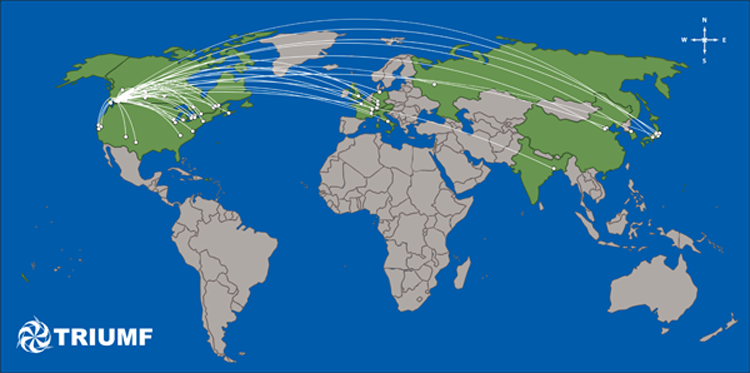TRIUMF as Canada’s Gateway to Global Science & Technology
The pursuit of key questions in physics requires the pooled talents and resources of multiple nations. No country can insulate itself from the global scientific community without seriously handicapping its own scientific and technological ability. As a national laboratory on the global stage, TRIUMF is Canada’s platform for international subatomic physics. It enables Canadian scientists to make leading contributions in international science projects and to access developments both in Canada and around the globe. Ultimately, TRIUMF helps attract and retain the best talent for Canada. International connections and collaborations are also the precursors to international business and trade. These strong international connections help Canadian industry benefit from progress made in research from all over the world.
Canada’s world-leading expertise in key areas makes it a welcome member of international scientific collaborations, and in turn we benefit by accessing significantly more expertise and technology than would be possible if all developments were done domestically. TRIUMF has memoranda of understanding with 32 foreign institutions in 16 different countries and has played key roles in Canadian involvement in international projects in Europe, Japan, and the United States. Foreign collaborators are also attracted to TRIUMF by its facilities and expertise; these visitors include senior scientists, post-doctoral fellows, students, and technical experts. Some bring equipment or materials, but all bring knowledge or expertise that strengthens the local scientific community.
Criteria
The Board of Management has approved the following policy for TRIUMF's substantive involvement in international activities. TRIUMF should seek international involvement (e.g., an activity or a formal partnership) when:
- It enables Canadian university scientists and students to work at the best facilities and with the top scientists in the world;
- The science facilities are not available in Canada;
- A significant benefit accrues to TRIUMF and/or Canada either in technology or infrastructure;
- Government policy encourages such collaboration; or
- TRIUMF has a critical mass in the activity or the activity significantly forwards the TRIUMF mission.
Outcomes
Through this strategy, TRIUMF aims to achieve the following outcomes:
- Work with the best in the highest-priority fields, no matter where they are;
- Attract international talent and investment to TRIUMF and Canada;
- Work with countries that the public (government) prioritize as important;
- Open new international markets for Canadian companies;
- Enhance TRIUMF's image as a conduit for international science and collaboration; and
- Generate global support for TRIUMF and its programs.
Approach
TRIUMF's approach to international engagement can be roughly organized into three phases with broad overlaps.
Scientific: Partnership usually starts with individual scientists identifying common work. TRIUMF would then seek to formalize international collaboration into a formal lab-to-lab Memorandum of Understanding that specifies scope, schedule, and resources contributed by both parties. The formal collaboration usually involves exchanges and sharing of personnel and equipment on an in-kind (rarely cash) basis.
Diplomatic: Once scientific connections are established and working well, TRIUMF would seek to brief the Canadian embassy in the foreign country about the activities and highlight the roles of both partners. Simultaneously, there would be effort to connect with the foreign consulate in Canada to brief them on the activities. The objective is to have embassies and diplomatic staff support the future of the partnership and guide future initiatives and visits.
Business: Once regular scientific and diplomatic relations are established, the goal is to connect Canadian suppliers or industrial partners with counterparts and customers in the foreign country.

Selected International Partners with Formal Agreements (excluding businesses and universities)
- Argonne National Laboratory, Argonne, USA
- Brookhaven National Laboratory, Upton, USA
- China Institute of Atomic Energy, China
- Deutsches Elektronen-Synchrotron (DESY), Hamburg, Germany
- CERN, Geneva, Switzerland
- Fermi National Accelerator Laboratory, Batavia, USA
- GANIL, Caen, France
- Gesellschaft für Schwerionenforschung mbH (GSI), Darmstadt, Germany
- High Energy Research Organization (KEK), Tsukuba, Japan
- Institut des Sciences Nucléaires (ISN), Grenoble, France
- Institute for High-Energy Physics (IHEP), Beijing, China
- Institute for Nuclear Research (INR), Russia
- Istituto Nazionale di Fisica Nucleare (INFN), Italy
- Japan Atomic Energy Agency (JAEA), Tokai, Japan
- Japan Proton Accelerator Research Complex (J-PARC), Tokai, Japan
- Karlsruhe Institute of Technology (KIT), Karlsruhe, Germany
- Lawrence Berkeley National Laboratory (LBL), Berkeley, USA
- Lawrence Livermore National Laboratory (LLNL), Livermore, USA
- Los Alamos National Laboratory (LANL), Los Alamos, USA
- Manhattan Isotope Technology, LLC, Lubbock, USA
- Ministry of Education, Science, and Technology (MEST), Seoul, Korea
- National Superconducting Cyclotron Laboratory (NSCL), East Lansing, USA
- Oak Ridge National Laboratory (ORNL), Oak Ridge, USA
- Paul Scherrer Institut (PSI), Switzerland
- Rutherford Appleton Laboratory (RAL), UK
- RIKEN Nishina Centre for Accelerator-Based Science, Wako, Japan
- SLAC National Accelerator Laboratory, Menlo Park, USA
- Thomas Jefferson National Accelerator Facility, Newport News, USA
- Toyota Central R&D Labs, Inc.
- UT-Batelle, LLC, USA
- Variable Energy Cyclotron Centre, Kolkata, India
Other Resources
- Several examples of TRIUMF’s involvement in international collaborations are highlighted here.
- The partnership between Canada and CERN via TRIUMF is discussed here.
- CERN's Director General commented on the value of international collaboration with TRIUMF in a July 2009 letter.
